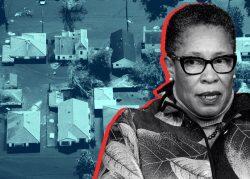The growing threat of climate risk could put the entire mortgage market underwater if all parties involved don’t begin to prepare soon, according to an industry report.
The report from the Mortgage Bankers Association’s Research Institute for Housing America says those close to the industry are wholly unprepared to forecast and confront risks from climate change.
Consumers, builders, landlords, appraisers, mortgage originators and servicers, mortgage investors, insurance companies and government issuers like Fannie Mae and Freddie Mac are all party to risk, which could cause lasting damage to the industry.
“Climate change may increase mortgage default and prepayment risks, trigger adverse selection in the types of loans that are sold to the GSEs, increase the volatility of house prices, and even produce significant climate migration,” the study says.
Mortgage industry risk models are honed in on credit and operating risk, but not climate risk. Instead, the industry relies on models from either FEMA or insurance companies. If FEMA alters the way it analyzes climate risk from flooding or other natural disasters, mortgage lenders could be stuck with hefty bills.
Additionally, the study pointed to changes coming to the National Flood Insurance Program that will almost certainly change prices for homeowners and therefore, mortgage values.
In addition to the risk and uncertainty facing mortgage entities, climate change also brings wide-ranging concerns for stakeholders across the industry. Natural disasters could displace borrowers, increasing the likelihood of defaulting on home loans. Bond investors could also pull away from the market due to climate risk, decreasing liquidity in the market.
Mortgage industry stakeholders can expect changes to better quantify future risks from disastrous weather events, extreme flooding and record temperatures.
“Firms will be pressed by regulators and investors to provide more quantitative estimates of the climate-related risks they face,” Dr. Sean Becketti, the report’s author, wrote. “In considering the example of estimating the impact of increased flooding on mortgage default risk, it is apparent that better and more standardized predictors of environmental risks will be needed.”
Read more


[CNBC] — Holden Walter-Warner
